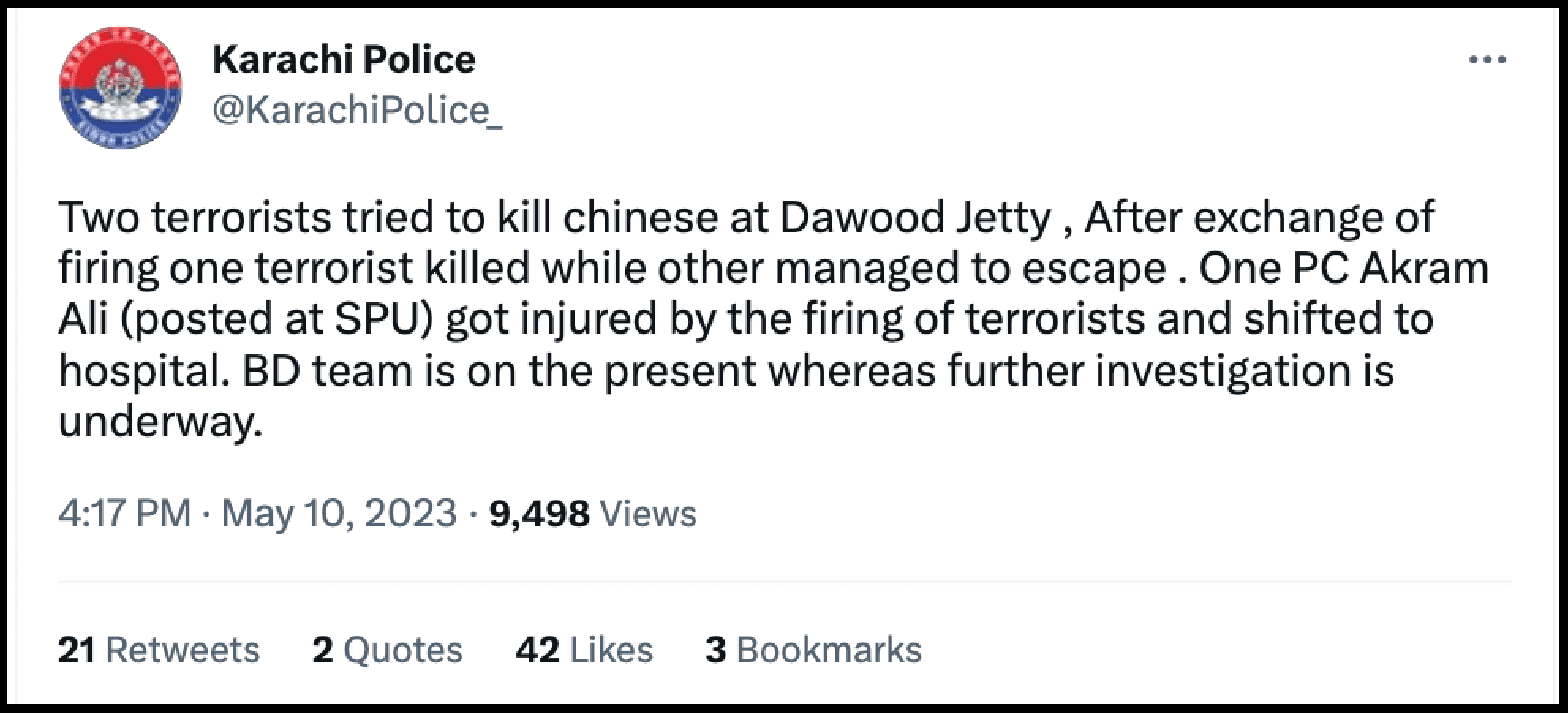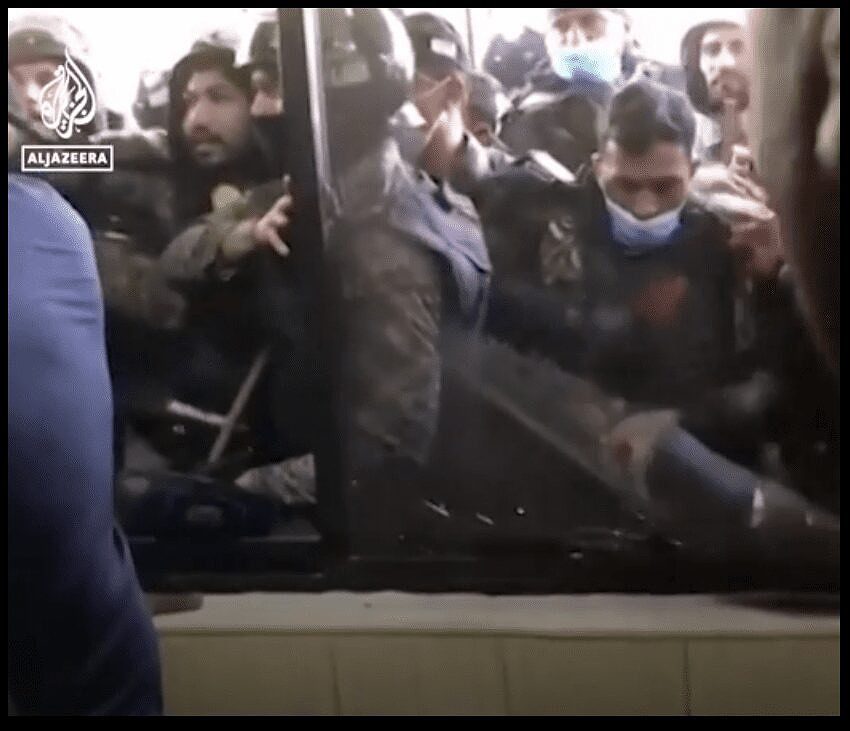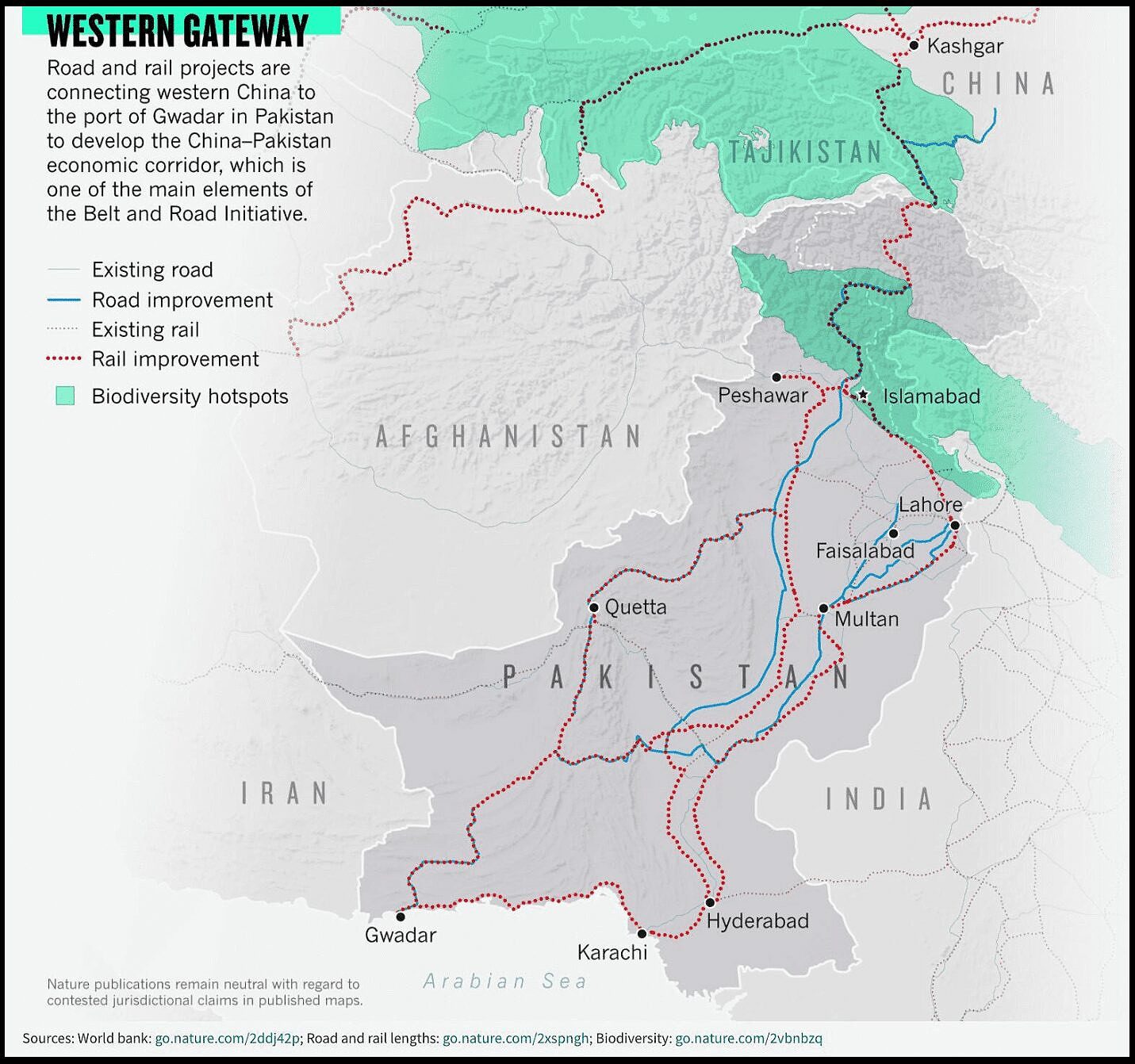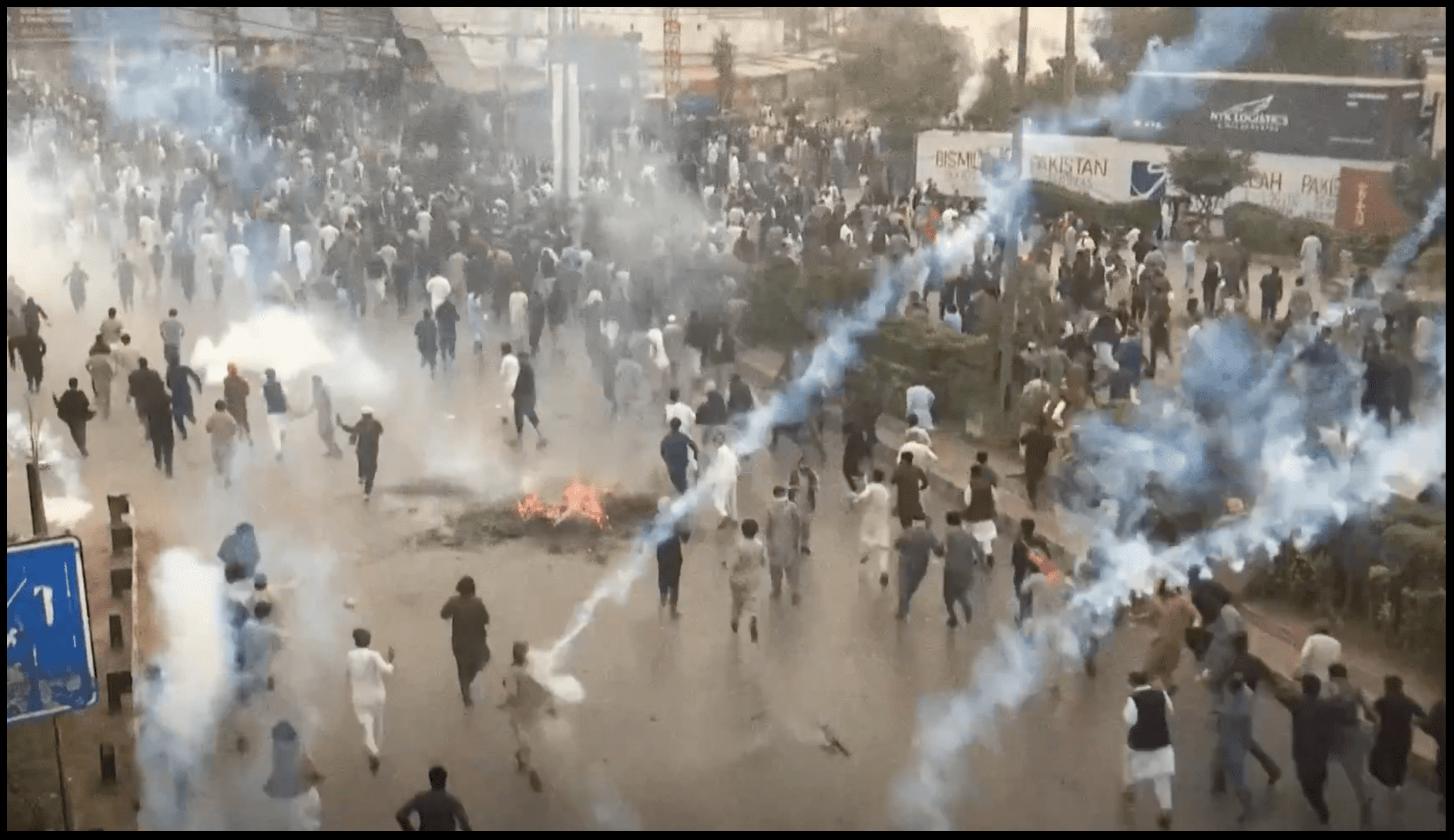Appreciate our quality journalism? Please subscribe here
The capability of Pakistan’s army to secure key assets — including those of Beijing — has been questioned following violent protests that roiled the nation after the arrest of opposition leader Imran Khan last week.
In several major cities protestors turned on Pakistan’s military — after Khan was arrested on May 9 in a spectacular courthouse raid — with military bases broken into and the homes of multiple senior military officials torched.
Chinese targets have also been attacked, which intelligence sources say is linked to growing anti-China sentiment, with Beijing seen as contributing to the nation’s increasingly precarious financial position.
Pakistan has become heavily indebted to China over the past decade under the China-Pakistan Economic Corridor (CPEC), part of Beijing’s transnational Belt and Road Initiative infrastructure program.
Pakistan now owes China US$30 billion, almost one-third of its total US$100bn foreign debt, with Beijing its single biggest creditor.
Last week two Pakistani gunmen attacked Chinese workers at a Karachi boatyard using weapons stolen from security forces amid the unrest; while sources said Chinese assets including electricity towers were attacked at Khyber Pakhtunkhwa, on the Pakistan-Afghanistan border.
Enjoying this article? CLICK HERE to support our important work

Tweet from Karachi Police. Source: Twitter
“Two terrorists tried to kill Chinese at Dawood Jetty,” Karachi Police tweeted regarding the attack.
“After exchange of firing one terrorist (was) killed while (the) other managed to escape”.
The boatyard is reportedly owned by a Chinese company and there were around 31 Chinese workers on site at the time of the attack.
At least nine people have been killed and hundreds more injured in the ensuing violence.
Pakistan police said over 2,800 people have been arrested and 22 military and other government buildings damaged.
The mass protests kicked off when Khan, an international cricket star-turned-politician, was arrested on Tuesday last week after around 100 paramilitary soldiers surrounded stormed an Islamabad court.

Khan is arrested in Islamabad last week. Source: Al Jazeera
Soon after, Khan’s arrest was found to be illegal, given he had been present at the court in relation to another matter, and he was released last Friday.
Khan was ousted as Prime Minister in April last year, shortly after losing his parliamentary majority, in a move he says was orchestrated by Pakistan’s army chief.
“The military is behind my arrest,” he said Sunday. “Pakistan is now being run by the army chief”.
Since losing power, the 70-year-old former international playboy has reportedly been charged with about 100 offences, all of which Khan denies.
“They know that we will sweep the elections, so they’ve been looking for an excuse to put me in jail,” he said this week.
Khan came to power in 2018 with the blessing of the Pakistan Army, but had a falling out last year over Khan wanting more say in international affairs.
He blames the military for his ousting, as well as for two attempts on his life, including last November.

Pakistan police breaking into court to arrest Khan last week. Source: Al Jazeera
On Saturday, in an address broadcast on YouTube, Khan called for more protests across the nation, saying: “Freedom does not come easily. You have to snatch it. You have to sacrifice for it”.
Khan is Pakistan’s most popular leader according to opinion polls and has been calling for elections — which must be held by October — to be held earlier.
The current uprising is unusual because protestors, spurred by Khan, are targeting Pakistan’s military, which typically sits at the apex of Pakistan’s power structure, with massive influence over the nation’s politics.
The Pakistan Army is said to be currently increasingly split over Khan.
Older military officials — some of which have allegedly benefited personally from China’s infrastructure projects — are generally seen as opposed to Khan, while many younger soldiers are reportedly supportive of the politician.
Khan’s surging public support — and the apparent conflict and weaknesses within the Pakistani Army — is playing out against a backdrop of financial turmoil, with Pakistan in the throes of one of the worst monetary crises in its 75-year history.

Home of Lahore Corps Commander Lt Gen. Salman Fayyaz Ghani allegedly raised by mob. Source: Twitter
The South Asian nation was savaged by floods last year, costing an estimated $30bn in damage and lost production, and has seen food prices spiral following Russia’s invasion of Ukraine.
Last month in its World Economic Outlook report the International Monetary Fund (IMF) predicted Pakistan’s economy will grow by 0.5 per cent this year — down from 6 per cent in 2022 — and face inflation of 27 per cent.
Pakistan is currently seeking a further US$1.1bn from the IMF — part of a US$6bn package brokered in 2019 — but release of the funding is contingent on Pakistan meeting a series of conditions, including raising taxes and securing funding from other nations.
Experts warn Pakistan will become insolvent without the latest IMF money, with its foreign exchange reserves “critical” having been heavily depleted by foreign debt repayments.
The CPEC, estimated at US$62bn, is the centrepiece of China’s Belt and Road Initiative (BRI) globally.
A central component involves Beijing taking possession of Pakistan’s major deep water Gwadar Port, delivering China direct access to the Arabian Sean and the Indian Ocean.

The “China-Pakistan Economic Corridor”, flagship project of the controversial Belt & Road infrastructure scheme. Source: Nature
The BRI is seen by many — including the US — as being used by Beijing as a Trojan horse to increase its global political and military interests, including by lumping poor countries with unsustainable debts so as to exert influence over them, in so-called “debt-trap diplomacy”.
Visiting Islamabad in February, US State Department Counselor Derek Chollet said the US had been “very clear about our concerns not just here in Pakistan, but elsewhere all around the world about Chinese debt, or debt owed to China”.
Beijing says it is being unfairly attacked for providing loans for infrastructure and development, where others are not willing to.
The Council on Foreign Relations, an independent US think-tank, says the BRI can be a “poisoned chalice” for countries that take on large amounts of debt.
“China views BRI projects as a commercial endeavour with loans close to a market interest rate that it expects to be fully repaid,” it writes.
US non-profit research group the Brookings Institution, in a detailed 2020 report, said the “opaque” CPEC mega-project was being driven by Pakistan’s military, rather than government, with key costing and other details “not revealed to the Pakistani Parliament”.
Khan “sought a reset” of CPEC when his government came to power in 2018 but saw a “swift pushback from China and from Pakistan’s military”, the report says.
In September 2018, facing soaring national debt, then commerce minister Abdul Razzak Dawood told media the previous government had done a “bad job negotiating with China on CPEC” and “gave a lot away” by failing to do their homework or “negotiate correctly”.
Ten days later, Pakistan’s chief of army staff went to Beijing without Khan — “on special invitation” of China President Xi Jinping – and announced his full support for China and the Belt & Road program.
“Pakistan’s Army shall ensure security of CPEC at all costs”, he announced.

Attack on Radio Pakistan in Peshwar city. Source: Twitter
On the ground in Pakistan, many say the proposed benefits of the program have failed to materialise, including because Beijing imports much of its labour and materials, rather than employing locals.
Among the government and military assets to be attacked after Khan’s arrest was the Pakistan Army’s General Headquarters in Rawalpindi, in the nation’s northern Punjab province.
Intelligence sources said Chinese assets were targeted soon afterward.
“While Chinese assets remained untouched in the first few hours of the protest, news soon spread that Pakistan army is transporting stacks of gold and cash (from) Chinese CPEC stations in Sindh and Baluchistan since they were unsafe,” said one local intelligence source.
“Similar incidents are also being witnessed at Khyber Pakhtunkhwa on the Pakistan-Afghanistan border, which is dominated by the Pathan community to which ex-PM Imran Khan belongs.
“The locals are seen taking out their anger on roads, electricity towers and assets built by Chinese companies,” said the intelligence source.
Ongoing attacks on Chinese citizens and assets in Pakistan presents major questions for Beijing, which has been calling on Islamabad for greater protection, including as recently as two weeks ago.
“Several Beijing-backed companies were given mining and construction contracts in Khyber region after Pakistan Army generals received kickbacks and went against the will of the local residents,” said the local intelligence source.
“To make things worse, confirmed news of mutiny is also received from multiple military areas where troops have refused to take orders from their generals to fire upon civilians.
“The incidents of Chinese assets being targets in particular is of specific concern since a clear division of political ideology is seen between regular troops and officers of Pakistan.
“By attacking Chinese units, people are aiming to take back valuables stored by Pakistan Army, which they believe was looted from the Pakistani people.”
BEFORE YOU GO – WE HAVE A SMALL FAVOUR TO ASK! Only around 1% of our readers currently contribute. Please help us stay afloat and telling these stories. Please SUBSCRIBE or make a one-off donation by CLICKING HERE. Thank you!
Anthony Klan
Editor, The Klaxon
Help us get the truth out from as little as $10/month.
Unleash the excitement of playing your favorite casino games from the comfort of your own home or on the go. With real money online casinos in South Africa, the possibilities are endless. Whether you’re into classic slots, progressive jackpots, or live dealer games, you’ll find it all at your fingertips. Join the millions of players enjoying the thrill of real money gambling and see if today is your lucky day!
The need for fearless, independent media has never been greater. Journalism is on its knees – and the media landscape is riddled with vested interests. Please consider subscribing for as little as $10 a month to help us keep holding the powerful to account.







